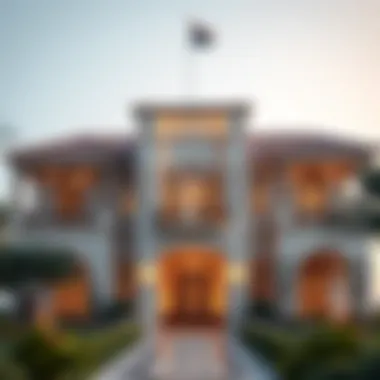Sheikh Zayed: His Life, Legacy, and Influence


Intro
Sheikh Zayed bin Sultan Al Nahyan stands as a towering figure in both the history of the United Arab Emirates and the larger narrative of global leadership. Born in 1918 in the small oasis town of Al Ain, his formative years were shaped by the harsh realities of a desert environment, where the essence of survival hinged on the cooperation of tribes and the wise use of scarce resources. His early life, infused with lessons in humility and resilience, would later influence his grand vision for the UAE.
His leadership style was marked by a blend of traditional values and progressive ideas. Sheikh Zayed's tenure as the ruler of Abu Dhabi and first president of the United Arab Emirates transformed a collection of disparate, economically challenged territories into a unified modern state. This remarkable journey involves the weaving of cultural threads, economic foresight, and a deep commitment to societal well-being.
Sheikh Zayed's legacy goes beyond politics; it encompasses a deep commitment to sustainability and environmental stewardship, an approach that is particularly relevant today amidst global climate concerns. His innovative thoughts on environmental issues were groundbreaking in the 20th century. He firmly believed in the importance of preserving the desert landscape and promoting sustainable practices in agriculture and development.
As we embark on this exploration of Sheikh Zayed’s life and contributions, it is essential to look at the multifaceted narrative that lies within his actions and beliefs. From his early struggles to the establishment of the UAE, and his relentless drive for social progress, his journey is laden with lessons and insights that resonate well beyond the borders of his beloved country. In this article, we will dissect the elements that made Sheikh Zayed a pivotal figure in the history of the region, and how his legacy continues to inspire new generations.
Ultimately, this investigation is not just about one man; it's about understanding the breadth of his influence and how the decisions he made continue to mold both the UAE and the wider world. With a focus on his lasting impact, this narrative promises to be both informative and reflective, guiding readers through the intricate tapestry of Sheikh Zayed’s extraordinary life.
Prologue to Sheikh Zayed
Sheikh Zayed bin Sultan Al Nahyan is not just a ruler; he is a towering figure whose life resonates deeply within the fabric of the United Arab Emirates. His journey from humble beginnings to the architect of a nation illustrates a unique blend of ambition and pragmatism. At the heart of this article lies an exploration of Sheikh Zayed’s influence on the UAE, offering crucial insights into his leadership style, societal reforms, and the legacy that continues to shape the region today.
Understanding Sheikh Zayed’s life opens a window into the evolution of a country that has transformed from a collection of individual emirates into a unified and thriving nation. His vision of unity and growth leads us to examine not just the milestones he achieved but also the principles that guided him.
By diving into Sheikh Zayed's early life and the path he charted towards leadership, we can appreciate the complexities of his character. Not only did he herald economic development, but he also placed significant emphasis on social welfare and environmental conservation.
This introductory section serves as a foundation for the discussions that follow. It prepares readers to delve deeper into the nuances of Sheikh Zayed’s contributions and influences, inviting them to grasp the full scope of his impact. Ultimately, this exploration ensures that we recognize not just a leader, but a visionary who remains a symbol of hope and progress.
"The greatest service which can be rendered to any country is to add a useful plant to its agriculture." - Sheikh Zayed
As we turn the page to the details of his early life, we unearth the experiences that molded Sheikh Zayed into the man who would later change the course of history for the UAE.
Early Life and Background
Sheikh Zayed was born in 1918 in Al Ain, a town rich in history and cultural significance. The son of Sheikh Sultan bin Zayed, he grew up in a period marked by simplicity and resilience. Education during this time was not formalized, yet the lessons learned in his early years were boundless. Sheikh Zayed learned the values of integrity, hospitality, and perseverance from his family and community. These foundational experiences shaped his outlook on leadership, emphasizing the welfare of the people above all.
The environment in Al Ain was harsh, with desert landscapes and a limited supply of water. This means survival required skill and knowledge of the land, lessons which Sheikh Zayed would carry with him throughout his life. His nurturing relationship with nature later informed his commitment to environmental stewardship, making him a champion of sustainable practices.
Path to Leadership
After the passing of his father in 1922, Sheikh Zayed assumed responsibility for his family at a very young age, stepping into a leadership role that would foreshadow his future. In the 1940s, as he took on more public duties, his vision began to crystallize. Recognizing the need for cooperation among the tribes of the region, he advocated for unity and modernization.
His appointment as the ruler of Abu Dhabi in 1966 marked a turning point, not just for him but for the entire emirate. Embracing modernization did not mean losing sight of traditions. Instead, he sought to blend the two, facilitating growth while honoring the heritage of the Emirates.
Sheikh Zayed's journey was not without challenges. Struggles with tribal divisions and varying interests among the emirates tested his resolve. Yet, through dialogue and diplomacy, he fostered trust and collaboration, culminating in the formation of the United Arab Emirates in 1971.
The leadership approach taken by Sheikh Zayed can be viewed as a textbook example of principled governance, mixing wisdom with empathy to create a nation that embraces diversity while promoting unity. As we transition to how Sheikh Zayed laid the groundwork for the UAE's establishment, his foresight and commitment become increasingly evident.
Founding of the United Arab Emirates
The founding of the United Arab Emirates (UAE) stands as a pivotal moment not just in the history of the region but also in the global context of nation-building. This formative stage was characterized by Sheikh Zayed bin Sultan Al Nahyan's tenacity and foresight, as he navigated a web of political intricacies and social dynamics. The United Arab Emirates now serves as a beacon of development, thriving amidst the rapid evolution of its infrastructure, economy, and social fabric.
Sheikh Zayed's vision was rooted in unity. He understood that the region's future hinged on pooling resources and talents from the seven emirates that make up the federation. His approach was methodical yet harmonious, reminding everyone that collaboration could amplify their strengths. The significance of this unity cannot be overstated; it allowed the emirates to stand as a formidable entity in a world that often overlooked smaller nations.
As we delve deeper, two key elements come to the forefront that highlight the foundational process of the UAE:
- The social dynamics among the emirates, where allegiance and familiarity fostered trust and collaboration.
- The external geopolitical environment, which posed both challenges and opportunities that the newly formed federation had to navigate carefully.


"Unity is not a goal to be achieved, but a means to create prosperity and stability."
The Formation Process
The process of formation was nothing short of a monumental diplomatic endeavor. In 1971, as political tides shifted, the emirates of Abu Dhabi, Dubai, Sharjah, Ajman, Umm Al-Quwain, Fujairah, and Ras Al Khaimah came together, not without challenges. Sheikh Zayed's adept handling of these difficulties helped cement their allegiance. The sheer will of the leadership to foster dialogue helped to smooth over disputes, paving the way for a more robust foundation.
The framework was established through the constitution adopted on December 2, 1971, which marked the formal inception of the UAE. Through this constitution, the emirates agreed on shared governance while retaining individual identities.
Key Agreements and Treaties
The formation might have been precipitated by a shared vision, but it was solidified through various agreements and treaties. Among the most significant was the Treaty of Union, which laid out the structure of governance and the distribution of responsibilities among the emirates.
Several crucial elements characterized these treaties:
- Economic Cooperation: Collaboration in oil production, trade agreements, and joint ventures underscored a shared economic fate.
- Internal Security: Ensuring collective security was vital. The formation of the UAE Armed Forces, along with a unified police service, became imperative for maintaining public safety and national sovereignty.
- Cultural Exchange: Agreements to promote cultural initiatives were established, emphasizing that the UAE identity would thrive through a rich tapestry of tradition and modernization.
Through these efforts, Sheikh Zayed not only birthed a nation but also illuminated a pathway for future leaders. This foundation set forth during the formation years would dictate the course of the UAE’s growth, inspiring the next generation while grounded in the essence of unity and progress.
For a more extensive overview of the UAE's founding, consult the resources at Wikipedia and Britannica.
The formation of the UAE remains a testament to Sheikh Zayed’s effective leadership and vision, crafting not merely a federation of emirates but a resilient nation poised for the challenges of a globalized world.
Political Philosophy and Governance Style
Sheikh Zayed bin Sultan Al Nahyan’s political philosophy and governance style played a pivotal role in shaping the landscape of the United Arab Emirates. His approach was deeply rooted in traditional values while simultaneously embracing modernity, which laid a lasting foundation for the UAE’s development. Sheikh Zayed believed that unity was the cornerstone of progress, and this philosophy became instrumental in his policies.
Vision for Unity
At the heart of Sheikh Zayed’s governance was his vision for unity. He recognized that in order for the UAE to thrive, the seven emirates needed to work together rather than in isolation. This mindset led to the creation of a federal system that balanced regional autonomy with national governance. By fostering a sense of belonging among various emirates, he ensured that each had a voice while promoting a common identity.
The 1971 formation of the UAE was a direct manifestation of his dream. He once asserted, "In unity lies strength." This ideal not only facilitated economic cooperation but also social cohesion among the emirates. By encouraging collaboration, Sheikh Zayed helped establish a robust framework where shared goals outweighed individual priorities, marking a hallmark of his leadership style.
Economic Development Initiatives
Sheikh Zayed’s commitment to economic development was groundbreaking for a region previously dependent on traditional industries. He strongly believed that economic diversification was essential for sustainable growth. Under his leadership, the UAE shifted its reliance from oil to various sectors, including tourism, trade, and technology.
- Investment in Infrastructure:
One of his notable initiatives was the ambitious development of infrastructure. Roads, schools, and hospitals sprouted almost overnight, paving the way for a prosperous future. The Sheikh Zayed Grand Mosque stands as a beacon of both architectural brilliance and cultural significance. - Encouragement of Foreign Investment:
Sheikh Zayed understood that foreign investment was crucial for knowledge transfer and economic diversification. He made the UAE an inviting landscape for international businesses, instituting policies that offered ease of entry and favorable conditions.
These strategies not only enhanced the country's economic landscape but also contributed to its global competitiveness. The UAE soon became known as an oasis of opportunity, drawing business leaders and expatriates from around the world.
Social Policies and Reforms
Understanding that economic growth requires an empowered populace, Sheikh Zayed implemented progressive social policies that aimed to uplift the standard of living for all citizens. His administration focused on health care, education, and social welfare to ensure equitable development.
- Education for All:
Education was one of his top priorities. He believed education was fundamental in shaping a nation's future. Schools and universities were established at an unprecedented rate, offering students a chance to pursue knowledge in various fields. - Women's Empowerment:
Sheikh Zayed championed women's rights, promoting gender equality in both education and the workforce. He encouraged women to take part in various sectors, from business to politics, helping to create a more balanced society.
"A nation’s progress depends on the education of its people, especially women, who play an integral role in society."
These reforms not only improved social welfare but also cultivated a multicultural society, where various nationalities could coexist and thrive. Under Sheikh Zayed’s vision, the UAE transformed into a nation that values both progress and tradition, illustrating that a balanced approach can yield remarkable results.
Through his political philosophy and governance style, Sheikh Zayed laid the groundwork for a nation that has consistently strived for unity, economic growth, and social equity. His legacy continues to influence the UAE's trajectory, inviting both national pride and international respect.
For further insights into the governance style of Sheikh Zayed, you can explore resources like Britannica and Wikipedia.


Sheikh Zayed's Role in Environmental Conservation
Sheikh Zayed bin Sultan Al Nahyan, the visionary leader of the United Arab Emirates, recognized early on that protecting the environment was not just a noble endeavor but an essential responsibility. His commitment to environmental conservation has become a crucial aspect of his legacy, demonstrating how the integrity of nature and development can go hand in hand. In this section, we will examine Sheikh Zayed's significant contributions to conserving the environment, focusing specifically on his desertification prevention efforts and the establishment of protected areas in the UAE.
Desertification Prevention Efforts
Desertification, a persistent issue in many arid regions including the Arabian Peninsula, poses a direct threat to biodiversity, water resources, and overall ecological balance. Sheikh Zayed understood that the encroaching deserts could not be ignored. He spearheaded numerous initiatives aimed at combating desertification, with an eye towards preserving the land for future generations.
One standout project was the development of extensive tree-planting campaigns. Known as the "Green Sheikh," Zayed initiated the Ghaf Tree plantation projects, promoting the resilience of this native species to withstand the harsh arid climate. This is not just about beautifying the landscape; these trees play a critical role in stabilizing the soil, which helps prevent further desert encroachment.
Moreover, Sheikh Zayed established several organizations, such as the UAE's Environmental Research and Wildlife Development Agency, to facilitate research focused on sustainable development practices. These efforts underline his belief that economic progress could coexist with environmental stewardship. A combination of legislation and local community involvement also supported these initiatives, ensuring that desertification prevention became a shared goal among citizens as well.
"A nation’s greatness is measured by how it treats its weakest members and the environment that sustains them." – A reflection of Sheikh Zayed’s philosophy on environmental care.
Establishment of Protected Areas
Another pillar of Sheikh Zayed's environmental legacy involves the establishment of protected areas throughout the UAE. Recognizing the rich biodiversity of the region, he took proactive steps to safeguard wildlife and natural habitats from development pressures.
Key initiatives include the designation of the Dubai Desert Conservation Reserve and Sir Bani Yas Island, created as vital sanctuaries for endangered species. These areas not only provide safe havens for wildlife but also serve as critical labs for ecological research and public education programs about conservation.
On a broader scale, Sheikh Zayed’s initiatives contributed to the UAE’s commitment to international environmental agreements. His efforts helped position the UAE as a leader among Gulf nations regarding conservation practices.
In summary, Sheikh Zayed’s role in environmental conservation is a testament to his wider vision of development and sustainability. Through robust desertification prevention efforts and the solid establishment of protected areas, he laid down the groundwork for balanced growth that respects and nurtures the natural world. These initiatives have profound implications not just for the sustainability of the UAE but also serve as a model for other desert nations worldwide.
For further understanding of Sheikh Zayed's environmental policies, check relevant resources such as the World Wildlife Fund and UAE's Ministry of Climate Change and Environment for more insights.
Cultural and Educational Contributions
Sheikh Zayed's influence extended far beyond politics and economics. His vision encompassed a profound understanding of the value of culture and education. He believed that a nation's strength lies not only in its financial wealth but in its intellectual and cultural richness. This aspect of his leadership has shaped the very fabric of the UAE, laying the groundwork for a society that deeply values knowledge and cultural heritage.
Promotion of Arts and Heritage
One of Sheikh Zayed's key contributions was his unwavering support for the arts and preservation of cultural heritage. He understood that art serves as a mirror reflecting the identity of a people. Therefore, initiatives to promote local arts, crafts, and traditions were crucial under his leadership.
Significant Initiatives
- Establishment of Cultural Institutions: Several museums and cultural centers were initiated during his tenure, serving as hubs for knowledge and creativity. The Louvre Abu Dhabi, for instance, is a modern embodiment of cross-cultural dialogue and understanding, born from a vision of global cooperation.
- Celebration of National Traditions: Sheikh Zayed acted as a patron of traditional festivals that showcase Emirati folklore, helping to keep the rich tapestry of local customs alive. Events like the Heritage Days foster intergenerational awareness of cultural practices.
"A nation without a past is a nation without a future."
— Sheikh Zayed bin Sultan Al Nahyan
Through these efforts, Sheikh Zayed aimed to instill a sense of pride in Emiratis about their heritage, enabling them to appreciate their roots while engaging with the wider world.
Investment in Education
Education was another pillar of Sheikh Zayed’s legacy. He was passionate about building a robust education system that would empower the future generation. Sheikh Zayed’s approach encompassed more than just establishing schools; it was about fostering a culture of learning and progression.
Educational Reforms and Developments
- Founding Educational Institutions: His commitment can be seen in the establishment of institutions like United Arab Emirates University, driving academic excellence and research.
- Inclusivity Initiatives: Special attention was given to ensure education was accessible to all segments of society, including female students, which was quite progressive for the time. This created an environment where women could thrive, contributing to the nation's growth.
- Global Partnerships: Sheikh Zayed encouraged collaborations with renowned educational institutions worldwide, enabling the UAE’s students to benefit from global knowledge and expertise.
By investing in education, Sheikh Zayed set the stage for the UAE to become a hub of innovation and scholarship, ensuring that the nation remains competitive on the global stage.
Legacy and Memorialization


The lasting impression that Sheikh Zayed bin Sultan Al Nahyan made on the United Arab Emirates and the world at large speaks volumes about the significance of his legacy. Examining his contributions leads to a broader understanding of his impact, not only in terms of physical and economic developments but also in how he shaped the cultural and social fabric of Emirati society. The topic of legacy and memorialization in this context emphasizes the ways Sheikh Zayed’s vision continue to inspire and influence future generations, reflecting the depth and breadth of his stewardship.
National and International Recognition
As one ponders the legacy of Sheikh Zayed, it is essential to recognize the numerous accolades he has received, both at home and abroad. His steadfast commitment to stability, progress, and environmental sustainability earned him widespread acclaim. International bodies, like the United Nations, acknowledged his humanitarian efforts, designating 2018 as the "Year of Zayed" to commemorate his work and values.
The awards he received over the years are not just mere decorations; they represent a testament to his far-reaching influence. Notably, the Sheikh Zayed Book Award celebrates literary talent across the Arab world and is held in high regard, reflecting his esteem for education and culture.
- Sheikh Zayed is considered a pivotal figure in the Middle East, often regarded as a father figure not just for the UAE but for the entire Gulf region.
- His initiatives in education and environmentalism have garnered him global recognition, positioning him alongside other great leaders who prioritized similar causes.
In a world where swift change is often the norm, Sheikh Zayed's enduring legacy is a beacon for many, shedding light on the values of unity and foresight.
Institutions Established in His Honor
The establishment of institutions in Sheikh Zayed’s honor serves as a blueprint for his dedication to learning, culture, and conservation. From educational institutions to environmental programs, these structures echo his ideals and promote continued progression in areas that he valued deeply.
Some of the most notable institutions include:
- Sheikh Zayed University: This institution stands as a symbol of educational excellence, embracing Sheikh Zayed's vision of empowering youth through knowledge.
- The Sheikh Zayed Foundation: Focused on humanitarian efforts, this organization extends support to various initiatives, aligned with the humanitarian principles that Sheikh Zayed championed throughout his life.
- Sheikh Zayed National Museum: Set to be a landmark in Abu Dhabi, this museum will celebrate the heritage, accomplishments, and values of Sheikh Zayed, ensuring that future generations appreciate his impact.
"A nation's greatness is measured by how it treats its weakest members." - Sheikh Zayed
Through these institutions, Sheikh Zayed's virtues are ingrained into the fabric of society, reminding both Emiratis and global citizens of the importance of leadership that seeks not just to develop, but to uplift.
Sheikh Zayed in the Context of Dubai's Growth
Sheikh Zayed bin Sultan Al Nahyan's influence can be seen most profoundly through the lens of Dubai's transformation from a small fishing village into a global metropolis. This journey reflects not merely urban development but the strategic vision that Sheikh Zayed embodied. His leadership laid the foundation for a sophisticated infrastructure, vibrant economy, and cultural richness that characterize modern Dubai.
Visionary Leadership and Urban Development
In the mid-20th century, Dubai was a modest locale, overshadowed by its more expansive neighbors. Yet, Sheikh Zayed’s visionary leadership shifted the paradigm. Recognizing the potential within the region, he sought to modernize not just Abu Dhabi, but also to support his brother emirates, namely Dubai.
- Infrastructure Investment: Zayed believed that a robust infrastructure was essential. His government invested heavily in roads, schools, hospitals, and other vital services that fostered urbanization. By promoting strategic ventures, he ensured the cities were equipped for an expanding population – laying physical tracks for progress.
- Unity in Diversity: Under his leadership, Dubai's urban development was marked by a dialogue of cultures. He understood that diverse communities can coexist harmoniously. This perspective not only attracted expatriates but also enriched the cultural fabric of the emirates.
Sheikh Zayed’s investments in public amenities were met with harmonious collaboration among emirates. With Dubai taking a lead in tourism and commerce, this interconnected growth further fortified the UAE’s economy, creating synergies that fueled progress for all emirates involved.
Impact on Dubai's Real Estate Market
The transformation of Dubai's skyline reflects Sheikh Zayed's spirit of innovation. His vision is imprinted on the real estate market of Dubai, which has evolved dramatically, thus impacting various stakeholders like investors, homebuyers, and property developers.
- Boost in Foreign Investment: By creating an attractive environment, Zayed’s policies encouraged foreign investment in real estate. This influx of capital not only enhanced property values but also led to a boom in developments such as the Burj Khalifa and Palm Jumeirah, iconic symbols of Dubai's progress.
- Regulatory Framework: Sheikh Zayed emphasized the need for a structured regulatory environment. This was crucial for promoting transparency and protecting the interests of both local and international investors. The establishment of property laws allowed for a flourishing market, making Dubai a top-rated destination for real estate investment.
- Sustainable Development: Awareness of environmental principles during Zayed's era set the groundwork for a sustainable urban landscape. Developments are increasingly balanced with green spaces, ensuring that as the city grows, it maintains its commitment to sustainability.
“Sheikh Zayed’s insights into environmental stewardship laid the groundwork for Dubai's contemporary approach to urban planning.”
Ending
In closing, the narrative of Sheikh Zayed bin Sultan Al Nahyan's life and legacy stands as a beacon of inspiration and insight. The importance of understanding his enduring influence cannot be overstated, particularly in the context of the UAE's rapid evolution into a global hub, especially in real estate, tourism, and education. Sheikh Zayed’s vision extended beyond mere governance; it paved the way for a society that values harmony, sustainability, and innovation.
Sheikh Zayed's Enduring Influence
Sheikh Zayed's contributions have left a deep imprint on the UAE and continue to resonate across various sectors. His unique approach combined a commitment to tradition with a visionary outlook that drove progress. The values he championed—unity, tolerance, and environmental stewardship—are foundational to the UAE's identity today.
His pioneering work in urban development and economic diversification has attracted investors and expatriates alike, creating a flourishing landscape for real estate opportunities. Investors recognize that Sheikh Zayed's principles still guide developments across Dubai and beyond, as the region strives to strike a balance between modernization and heritage preservation.
"Sheikh Zayed taught us that true leadership lies in serving the people, ensuring their welfare while pursuing progress."
Moreover, his endeavors towards education and cultural initiatives foster a society rich in knowledge and ideas. Through the establishment of institutions and partnerships, Sheikh Zayed laid the groundwork for a robust educational sector that empowers future generations.
In summary, the impact of Sheikh Zayed is not a relic of the past but rather a dynamic force shaping the present and future of the UAE. His legacy continues to inspire real estate agents, investors, expatriates, property developers, and homebuyers, reminding them that they are part of a broader narrative—a story of growth, unity, and possibility. Extracting lessons from his life can guide current and future leaders in navigating the complexities of a rapidly changing world. As the UAE continues to rise on the global stage, the foundational work of Sheikh Zayed proves to be as relevant now as it was during his tenure. By understanding and embracing his legacy, stakeholders can ensure that the UAE not only thrives but does so while honoring its rich heritage.



